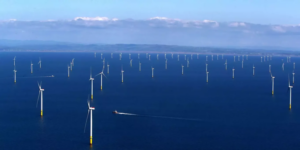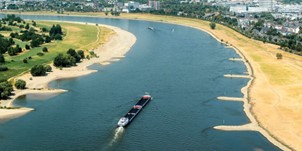Lead Supervisor: Reinhard Schiemann, University of Reading, National Centre for Atmospheric Science
Email: r.k.schiemann@reading.ac.uk
Co-supervisors: David Brayshaw, University of Reading, Department of Meteorology; Laurent Dubus, RTE Réseau de Transport d’Electricité, Paris; Christian Grams, Karlsruhe Institute of Technology (KIT), Institute of Meteorology and Climate Research
Weather affects both electricity supply and demand, for example during still and cold winter days when low supply from wind turbines coincides with high demand for heating. Calm and hot summer weather can put pressures on fuel supply chains, the cooling capacity of power plants, and wind power generation, while also benefitting solar energy production. In the UK and northwest Europe, 2021 saw very low wind speeds, while the hot summer of 2022 brought shipping on the river Rhine almost to a standstill and curtailed nuclear power generation in France due to a lack of cooling water (Figure 1). These events highlight the need for the energy industry to anticipate and manage these extremes, which in turn requires research to determine how these impactful types of weather are affected by climate change: this is the aim of this PhD.

Walney Extension windfarm off Cumbria coast

Coal barge on the Rhine during low flow. Rivers are transport links and provide cooling water to power plants.
Two factors to consider when assessing the impact of extreme weather on the energy sector are forced climate change and natural variability. Forced change of Earth’s climate is due to, for example, anthropogenic greenhouse gas emissions. Natural variability refers to variations in the climate system that occur even in the absence of forced change (and in parallel to it). On timescales of years to a few decades – i.e., the typical planning horizon for energy-systems – it is an open question as to which of these two processes will dominate variations in extreme weather impacting the energy sector. Untangling the role of each is challenging, but possible, and will be a central research question for this thesis.
This project will address fundamental science questions about extreme weather in a changing climate while also generating knowledge and data urgently required by the energy industry (e.g., Bloomfield et al. 2021). Using a combination of newly available tools, we will answer the following questions:
- What weather conditions affect the energy sector most critically and how is the occurrence/persistence of these conditions affected by forced climate change and natural variability?
- What are the large-scale drivers of these conditions – can their occurrence and severity be linked to physical phenomena such as weather regimes and jet-stream and storm-track changes over the North Atlantic and Europe?
- What storylines of future extreme weather and impacts on the energy sector are possible over the next decades, and how can the energy sector prepare for these storylines?
Earth’s evolving climate exhibits forced change and natural variability in parallel and the two cannot be diagnosed separately using observations. To achieve this separation, Large Ensembles of global climate model simulations are created in which different plausible evolutions of the climate are simulated by running a model many times over with different starting conditions. Large Ensembles are costly and a relatively recent tool for climate science (Deser et al. 2020), and a new Large Ensemble with the UK climate model is being created as part of the national science programme CANARI (Climate change in the Arctic-North Atlantic Region and Impacts on the UK). The CANARI Large Ensemble is unique in terms of the combination of ensemble size, model resolution, and available output to characterise the impact of weather on the energy sector. Within CANARI, supervisor Schiemann leads the creation of the Large Ensemble and this PhD project will be one of its first applications.
To address the research questions, we will first select relevant types of extreme weather (e.g., so-called wind droughts; Q1) and examine which weather regimes are conducive to extreme weather for the energy sector (Q2). A regime classification based on seven weather regimes that are defined year-round and capture the response of renewable power generation to the prevailing atmospheric flow will be used (Grams et al. 2017, Büeler et al. 2021). The daily weather regime will be determined for the entire CANARI Large Ensemble.
Finally, we will derive storylines (Shepherd 2019), different possible trajectories of the climate system and manifestations of extreme weather as represented by the Large Ensemble (Q3). These storylines will be characterised in terms of surface impacts, driving weather regimes, and decadal atmosphere and ocean variability over the North Atlantic-European region. In addition to the meteorological characterisation, we will use established power system models (https://pypsa.org, https://callio.pe) – estimating power supply and demand from meteorological variables and ‘dispatching’ power across a physical network – to assess the resilience of the energy sector for different storylines.
Training opportunities:
The project will include collaboration with and a placement at RTE, the French power system transmission operator, to co-design the storylines. Training in applying the weather regimes classification will be available through project partner Grams and is envisaged to include a short research visit.
The first year of the PhD at Reading includes up to 6 modules of Reading’s globally recognised MSc course – which ones and how many will be decided with the supervisors taking into account the student’s background and interests, and the requirements of the project. The student will also benefit from and contribute to the Department of Meteorology’s vibrant academic life, for example in weekly research group meetings (such as Energy Meteorology, Dynamical Processes, and Climate Dynamics) and the seminar programme. In addition to training through SCENARIO and the Department of Meteorology, specific NCAS training, such as the JASMIN workshop, is also available.
The student will attend relevant training courses, such as:
- ECMWF courses, e.g., “Predictability, dynamics and applications research”;
- OpenMod energy workshops;
- International Conference on Energy and Meteorology
- World Energy & Meteorology Council’s training courses/summer schools(*); and
- Next Generation Challenges in Energy-Climate modelling workshops(*).
Supervisors Brayshaw and Dubus play a lead role in activties marked with * and opportunities for the student to help in teaching these courses will likely arise later in the PhD.
Student profile:
We are looking for an enthusiastic student with a natural science background from subjects like meteorology, physics, environmental/earth science, or mathematics, with demonstrated strong analytical and quantitative skills, and a keen interest to study the physics of extreme weather events and the statistics of their occurrence and impacts. The student will also need to have or acquire the necessary programming and data analysis skills required for the analysis of big climate data sets.
Funding particulars:
This project will feature CASE sponsorship from RTE, the French power system transmission operator.
References:
Bloomfield, H. C., Brayshaw, D. J., Troccoli, A., Goodess, C. M., De Felice, M., Dubus, L., Bett, P. E. & Saint-Drenan, Y.-M. (2021). Quantifying the sensitivity of European power systems to energy scenarios and climate change projections. Renewable Energy, 164, 1062–1075. https://doi.org/10.1016/j.renene.2020.09.125
Büeler, D., Ferranti, L., Magnusson, L., Quinting, J. F., & Grams, C. M. (2021). Year-round sub-seasonal forecast skill for Atlantic–European weather regimes. Quarterly Journal of the Royal Meteorological Society, 147(741), 4283–4309. https://doi.org/10.1002/qj.4178
Deser, C., Lehner, F., Rodgers, K. B., Ault, T., Delworth, T. L., DiNezio, P. N., et al. (2020). Insights from Earth system model initial-condition large ensembles and future prospects. Nature Climate Change, 10(4), 277–286. https://doi.org/10.1038/s41558-020-0731-2
Grams, C. M., Beerli, R., Pfenninger, S., Staffell, I., & Wernli, H. (2017). Balancing Europe’s wind-power output through spatial deployment informed by weather regimes. Nature Climate Change, 7(8), 557–562. https://doi.org/10.1038/nclimate3338
Shepherd, T. G. (2019). Storyline approach to the construction of regional climate change information. Proceedings of the Royal Society A: Mathematical, Physical and Engineering Sciences, 475(2225). https://doi.org/10.1098/rspa.2019.0013

